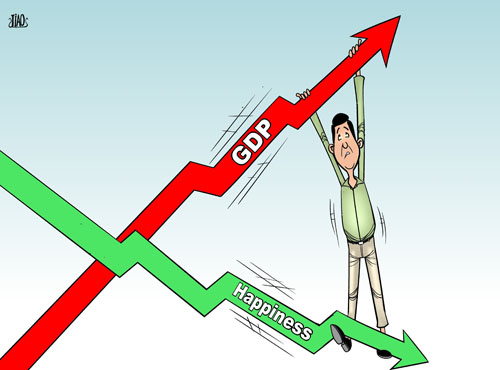The dream of happiness
 |
|
Money isn't everything [By Jiao Haiyang/China.org.cn] |
In Yevgeny Zamyatin's novel We, the author develops a society where everyone must feel happy. In Zamyatin's perfectly cheerful world, people subscribe to self-hypnosis by muttering to themselves "I am so happy ... so happy". If citizens do not accept this flawless utopia, the government's duty is to force happiness upon them.
This spring in China, happiness has suddenly become a popular term. Cities are nominating themselves for titles like "the Happiest City in China," and it seems there are dozens of cities that have assumed this distinction. As this happiness craze continues to froth, the latest survey sponsored by the China Development Research Foundation showed that nearly 75 percent of Chinese urban citizens feel happy, eerily close to the perfect world that Zamyatin imagined. In another poll on general happiness index conducted by Gallup Organization, an international consulting firm that has over 40 offices in 27 countries and based in Washington, China's mainland ranked 125th in happiness among 155 countries and regions.
It's a bit difficult to tell whether the Chinese are happy or not from the polls, but clearly the happiness issue is now starting to influence the country's policy. This January, the Guangdong provincial government announced that Guangdong's target GDP growth rate for the new Five-Year Plan is 8 percent, much lower compared with the rate during the last five years. The government also specified a "Happy Guangdong" as one of its top targets for the 12th Five-Year Plan period that starts this year. Guangdong Provincial Communist Party Secretary Wang Yang noted the goals of "accelerating the transformation and upgrade and building a happy Guangdong," in the province's Five-Year Plan mission statement.
In a similar move, the Beijing municipal government announced that its new Five-Year Plan would lower its GDP growth expectation by 1 percentage point and raise residents' income by 2 percent. Chongqing will restructure its income distribution system and aim to lower its Gini Coefficient, a measure of the inequality of a distribution in society, from the current 0.42 to 0.35. For many, this represents that after 30 years of rapid economic development, GDP is no longer being prioritized above all else. The government is finally realizing that it's important that citizens feel the government is taking care of them and trying to increase their well-being.
At the end of the 1970s, China's GDP per-capita was only US$290. People only had basic provisions and struggled to survive, so the economic growth, in another words, the GDP growth became the Communist Party's most important task to tackle. A low level of economic condition along with the dream that everyone could become rich gave people the hope that they could pursue happiness. Thirty years later, China has overtaken Japan to become the world's second largest economy and the per-capita GDP is now US$3,800. As families' basic material needs have been met, the definition of happiness has also changed.
 0
0 






